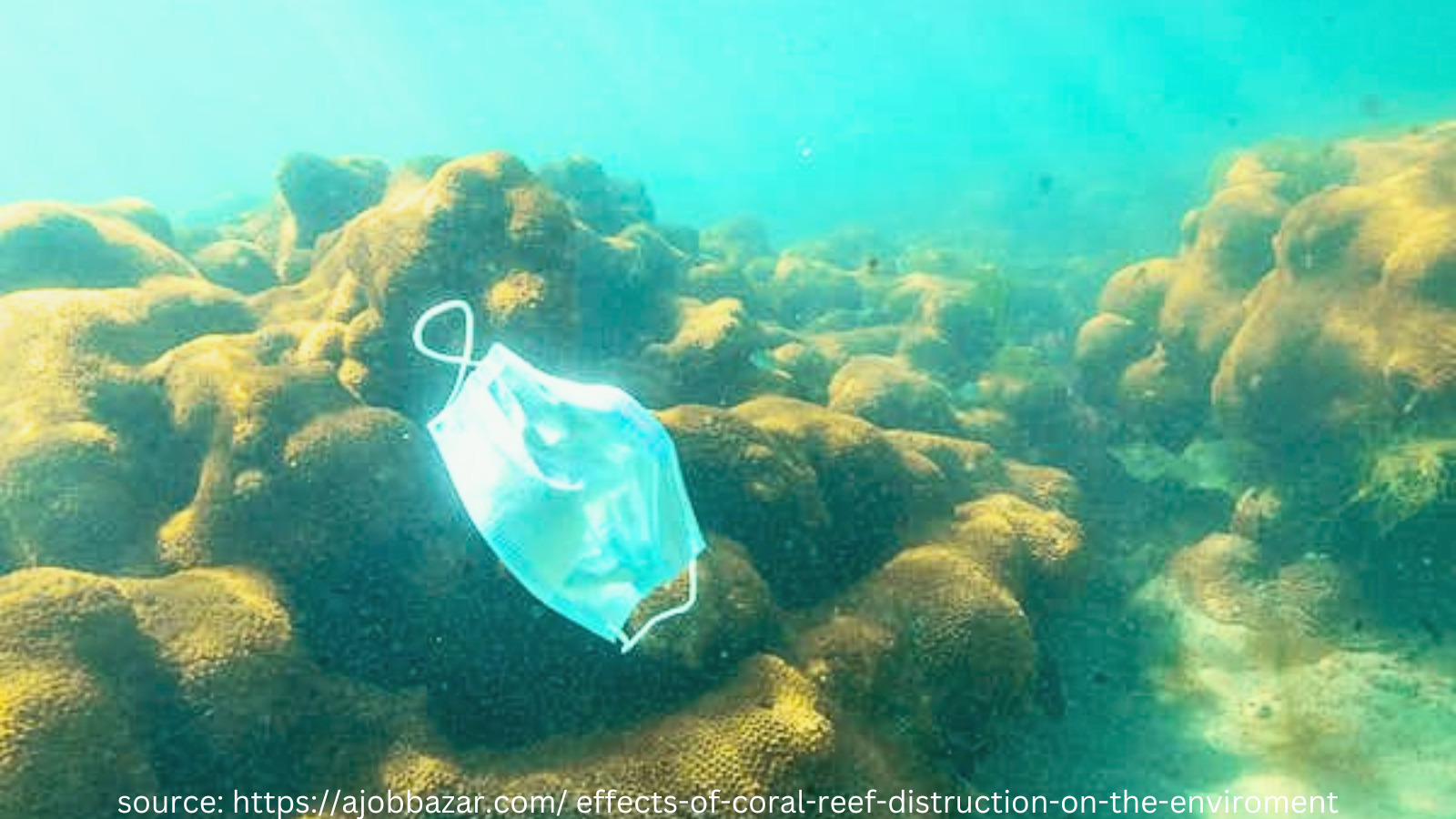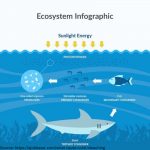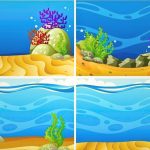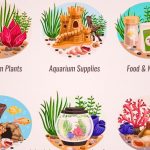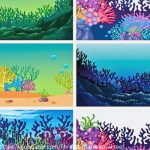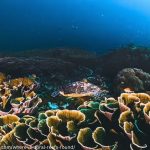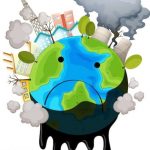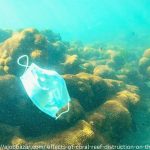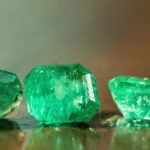Coral reefing is like growing, busy underwater towns. While they look to be far removed from our daily activities, they are incredibly important to our planet. Imagine if these vibrant communities were at risk. Global impacts of coral reefing damage can be compared to a superheroes losing their abilities. So the effects of coral reef destruction on the environment is a major problem nowadays. Mostly coral reefs are found in great barrier reefs.
What are the causes and effects of coral reef destruction on the environment?
Threats of the coral reefs few points about the causes and effects of coral reef destruction on the environment are as follows:
Causes
1. Climate Change: Coral reefs are under attack & bleeding globally Rising ocean temperatures caused global warming.
2. Pollution: Coral is harmed by chemicals, plastics, and wastewater which enter the water from land.
3. Overfishing: Catching too many fish upsets the ecosystem’s balance on coral reefing.
4. Harmful Fishing Methods: Coral reefs can suffer direct harm from methods like dynamite fishing.
5. Boat Anchors: Dropping anchors on coral reefs can destroy or smash the coral.
6. Tourism: Touching the reef and crowding by tourists can destroy coral.
7. Coastal Development: Putting up projects close to the water can destroy coral and bring pollution.
8. Invasive Species: Non-native species have a chance to destroy or kill coral and create environmental disruption.
Effects
1. Loss of Habitat: When coral is destroyed, many marine animals lose their natural environments.
2. Less Fish: Fewer fish impacted the food chain because of fewer coral reefs.
3. Higher Storm Damage: Weaker reefs offer less security against strong storms and waves.
4. Medicine Loss: Coral reefs may contain illness treatments that we lose.
5. Tourism Impact: Destroyed reefs harm local economy and tourism.
6. Acidification in the Oceans and Getting Warmed: The loss of coral reefs may cause oceans to become warmer and more acidic. Hence harming marine life.
Remember that protecting coral reefs is critical to sustaining them. the health and beauty of the oceans for both marine life and humans.
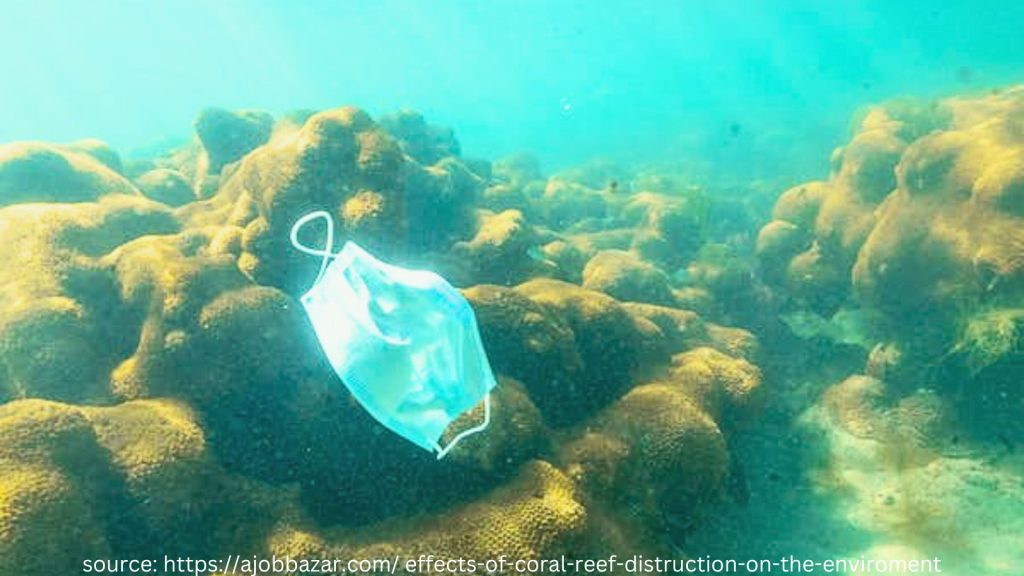
Environmental Damage
Human behavior can occasionally result in the accidental discharge of hazardous compounds over the water. Fungicides and others from farming, for example, frequently get dumped down waters and eventually end up in the sea. In addition, wastewater is occasionally dumped into the Atlantic Ocean. Polluting substances high in fertilizers can stimulate the establishment of algal growth, that may replace marine. Bacteria also can damage coral immediately. As an example, some microbes present in wastewater have been shown to bring about sickness in marine.
Harmful Methods for Fishing
Various techniques of fishing, especially the employment of seine river traps or weapons, might harm reefs that contain coral. Marine hooks also destroy coral reef systems. Fishing too much may diminish the quantity of algae-eating sea animals that maintain the living coral reef pristine. The reason for that can lead to an improvement in algae that can outperform marine.
The Climate Change
The increase in temperature has been linked to “coral bleaching”. The vast majority of the coral polyps share a mutually beneficial connection with the kinds of algae that produce light that reside around corals. The underwater coral polyp provides a protected habitat for the phytoplankton to thrive. In exchange, the green algae give the coral creature an amount of the vitamins and amino acids produced throughout sunlight. Sometimes temperatures in the water rise above normal levels, and coral polyps discharge their algal growth, which may allow them to pass away. The substance becomes white and is referred described as “dyed”.
Relaxing Operations
Visitors as per healthy as residents who visit reefs made of coral for entertainment reasons for example swimming o, bathing, scuba diving, or snorkeling can cause harm to the islands. A few people rip off chunks of coral and save them as keepsakes. In particular areas, humans walk on reefs filled with coral, which damages the plant life.
The destruction of the coral reef will disrupt the development of the medicine
The coral reefs are known as cabinets of the deep sea. That’s why creatures of all kinds that reside around the coral reef contain the secret to developing new remedies for a variety of illnesses and conditions. Researchers may discover drugs to cure a variety of conditions by studying the polyps’ unique chemical safeguards, including diseases such as melanoma, swelling, Alzheimer’s, pain, and heart disease. This indicates that the well-being of our underwater ecosystems is directly related to their health. If you want to view it in that manner, removing it is a terrifying thought.
Oxygen levels are greatly reduced
Any individual understands the fact that forests play a crucial part in creating oxygenation in our environment. This is because the rainforest of the Amazon is referred to as being the ‘lung tissue of the planet Earth.’ So, like that the oceans produce between fifty and eighty of the air on the earth’s surface. The majority of all this breathable air is created by phytoplankton and other photosynthesizing microbes. In the meantime, underwater organisms and individuals absorb oxygen in the environment that we breathe. A clean ocean is necessary for an environmentally friendly environment. A vibrant marine environment requires a suitable reef system.
What happens when coral reefs are bleaching?
Causes of coral bleaching are given below:
1. Homeless Creatures: Many aquatic species, including fish and crabs, lose their native environments.
2. Less Tasty Fish: Fish like shark and grouper are becoming less available for us to consume.
3. Weak Storm Barriers: Coral reefs protect the beaches from powerful storms and waves. We would be more exposed without them.
4. Medicine Loss: The Ocean may hold the key to the new development of drugs.
5. Tourism Issue: Fewer tourists visit reefs that are destroyed, which hurts nearby businesses.
6. Changing Ocean: Ocean acidification and warming caused by coral loss can harm marine life.
7. Less Color: Coral reefs add color and beauty to the aquatic environment.
8. Unbalanced Ecosystems: When the ocean’s balance is upset, all animals suffer.
9. Less Fun Snorkeling: The excitement of swimming and discovering coral reefs is lost to us.
10. Sad Marine Life: Many of our underwater friends experience sorrow when their homes are destroyed.
Therefore, safeguarding coral reefs is like safeguarding a mysterious portion of our earth where extraordinary creatures roam because the effects of Coral Reef Destruction on the Environment is very crucial.
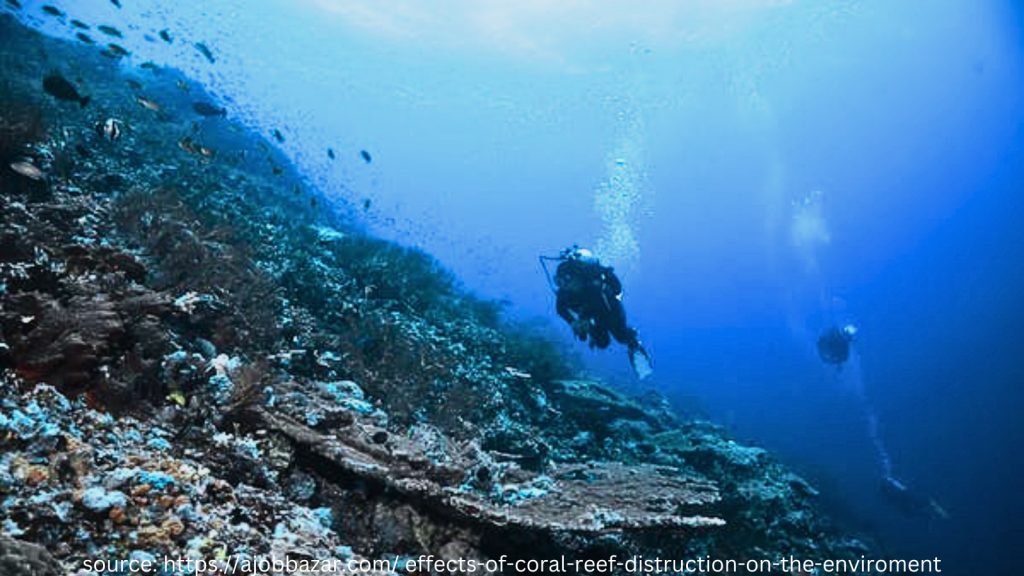
How do coral reefs affect the atmosphere?
Here are 10 brief explanations of how coral reefs impact:
1. Production of Oxygen: Coral reefs create oxygen, which we need to breathe, much like trees do on land.
2. Carbon Dioxide Absorption: Coral reefs absorb CO2, which slows climate change.
3. Cooling Effect: Reefs may chill the environment by providing privacy, similar to an umbrella, from the sun.
4. Storm protection: They serve as biological barriers that reduce the effects of strong storms.
5. Cloud Formation: Reefs can contribute to cloud formation by releasing tiny particles into the atmosphere.
6. Rainfall: Reefs may create clouds that can supply much-needed rain to adjacent countries.
7. Air Freshening: It’s nice to breathe the clear, salty ocean air close to reefs.
8. Tourism Income: Healthy reefs attract tourists, bringing money into local communities.
9. Research Opportunities: Scientists investigate reefs for climate and weather studies.
10. Insight: Reefs encourage us to safeguard the environment and make the world a better place.
Coral reefs are not just outstanding marine worlds. They also have an important impact on the air we breathe and the weather around us. Let us aim to observe the effects of coral reef destruction in the environment and the imperative to protect these ecosystems for a healthier environment.
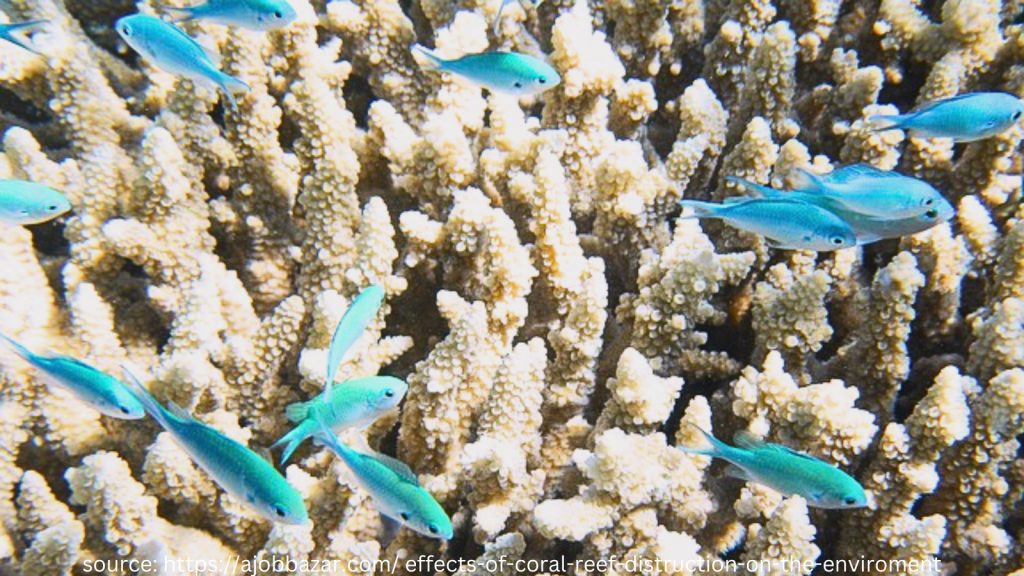
How can we protect coral reefs?
There are basic ways we can safeguard coral reefs as the coral reef is important to our weather.
1. No Touching: Avoid touching or walking on coral while snorkeling or diving. It’s dangerous!
2. Eco-friendly Sunscreen: To prevent dangerous chemicals, choose a sunscreen that is suitable for coral reefs.
3. Reduce Plastic: To keep the ocean clean, claim no to single-use plastics like straws and bags.
4. Boat Care: Exercise carefully while using boat anchors, do not dump them on the reef.
5. Responsible Fishing: Promote environmentally friendly techniques for fishing. Because it preserves healthy fish populations.
6. Coral-Friendly Seafood: Choose seafood that was harvested without causing damage to coral reefs.
7. Respect Wildlife: Establish a proper distance from marine animals and never obtain them as keepsakes.
8. Coastal Cleanup: Engage in or organize beach cleanups to keep waste from polluting the sea.
9. Support Marine Parks: Support the creation and safeguarding of marine protected zones (MPAs).
10. Spread the Word: Inform others about coral reefs and why they require our assistance.
We can all help to safeguard these gorgeous underwater habitats for future generations by taking some easy measures. Let us discover the effects of coral reef destruction on the environment and the urgent need for conservation measures.
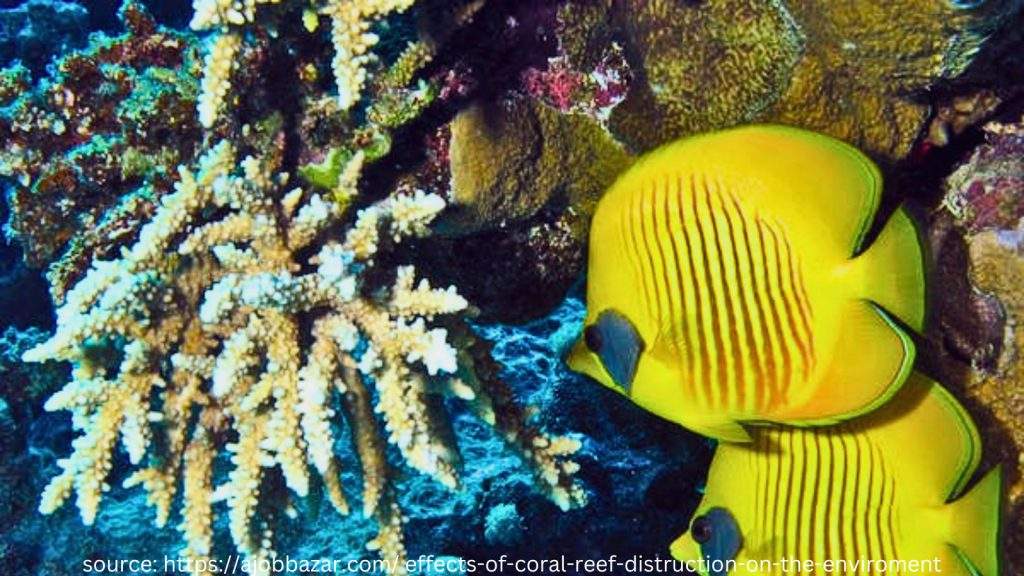
Environmental issues with coral reefs
Human activity has a significant influence on coral reefs, leading to their global decline. According to the Wikipedia, Coral mining, pollution (both organic and non-organic), overfishing, blast fishing, and the digging of canals and routes to islands and bays are all destructive practices. Disease, damaging fishing customs, and ocean warming are all possible threats to the coral reef. In addition, the ocean’s role as a carbon dioxide sink, the atmosphere changes, ultraviolet radiation, ocean acidification, viral infections, and the impact of dust storms moving agents to distant reefs, pollutants, and algal blooms are all factors impacting coral reefs.
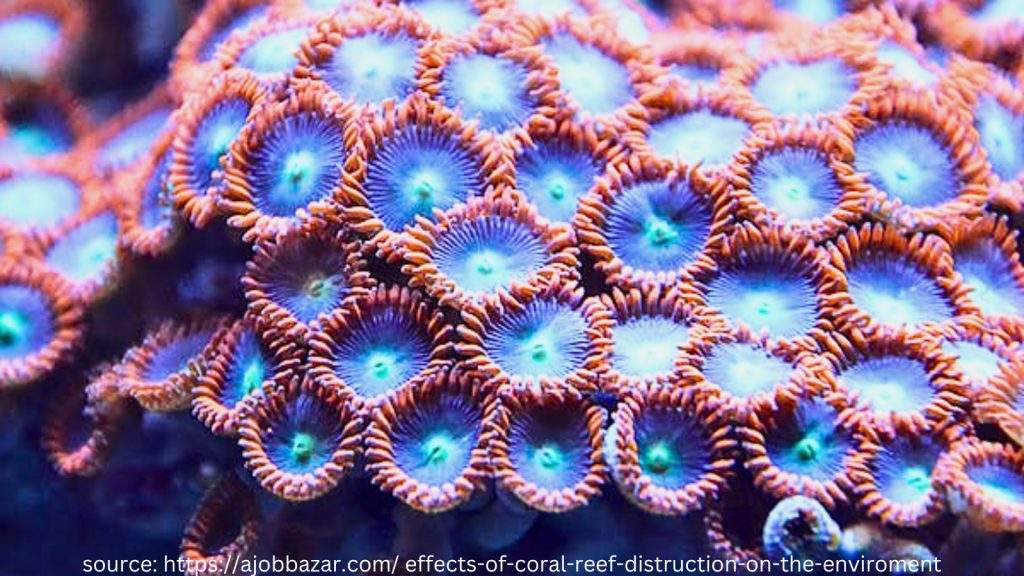
Why is it necessary for the preservation of coral reefs?
Coral reefs are oceanic towns where numerous aquatic animals reside. It is important to safeguard them because:
1. Habitat for Many Animals: Coral reefs are home to hundreds of fish, crabs, and other species. If the reefs are healthy, these animals will have a safe environment to live in.
2. Colorful and Amazing: Coral reefs are incredibly colorful, making the water a stunning and interesting location to explore. Imagine a world filled with rainbows under the sea!
3. Help Clean the Ocean: They act like nature’s cleaning crew, making the ocean cleaner by filtering out bad stuff.
4. More Yummy Fish: Healthy reefs mean more fish to catch and eat, like those at your favorite seafood restaurant.
5. Protection from Storms: Coral reefs protect our beaches from big waves and storms, so our homes and beaches stay safe.
6. Medicine Discovery: Some medicines, like superhero potions, come from the ocean, and reefs might hold the keys to finding new cures for diseases.
7. Fun for Snorkeling: Lots of people love visiting reefs for snorkeling and seeing all the cool fish and corals. It’s like exploring a magical world!
8. Bringing Rain to Lands: Coral reefs even help make clouds that bring rain to nearby lands, helping plants and farms grow.
9. Fighting Climate Change: Healthy reefs can help to slow down climate change. It absorbs carbon dioxide (CO2), which helps our world breathe better.
10. Inspiring people: By safeguarding coral reefs, we encourage people to care for the environment. It has the potential to improve the quality of life for all people.
So, protecting coral reefs is like being a guardian of an underwater treasure chest that makes our planet more colorful, fun, and safe for both sea creatures and people like us! So that, we have to careful about the wide-ranging effects of coral reef destruction on the environment and the preservation measure as coral reef is important.
For more, read: The Value of Corals: Beauty, Benefit & Economic Significance
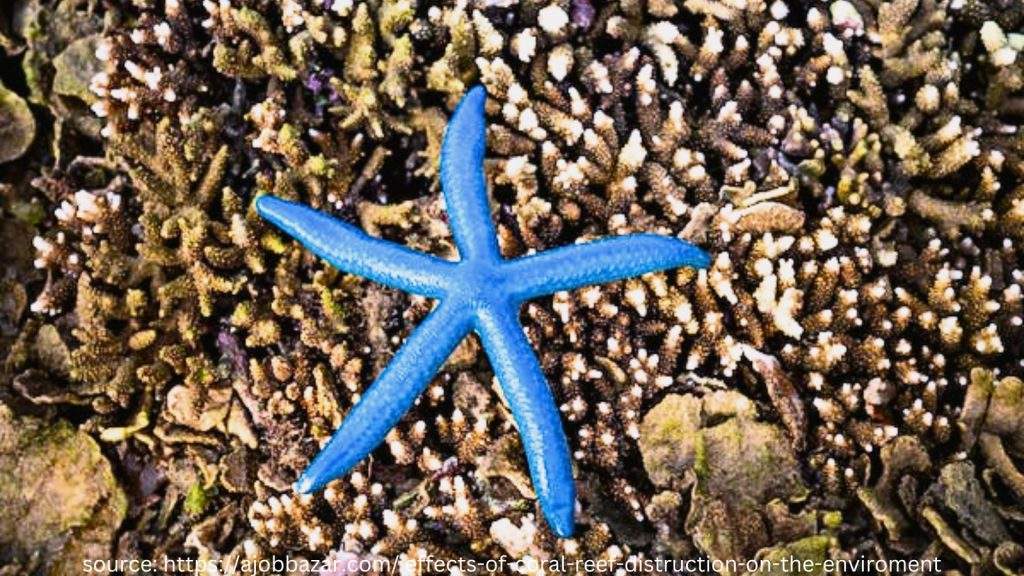
Conclusion
Finally, the negative environmental effects of coral reef degradation are like ripples on a pond. It spreading far and wide. When coral reefs are harmed, many aquatic species lose their natural environments. leaving humanity with less good fish to eat. It also means that our beaches are less sheltered from storms, and we may lose out on novel medications discovered in the water.
Reef destruction can also impair tourism. It was rendering the spectacular undersea ecosystem inaccessible to humans. Furthermore, the loss of coral reefs can cause the water to warm. Or it becomes more acidic, which is bad for marine life. So, the value of corals is huge.
So, defending coral reefs is like becoming an aquatic superhero. When we care for these incredible underwater environments, we not only benefit marine animals but also make our planet more beautiful and balanced. It’s a little like being a guardian of a magical part of our world, and we’re all responsible for keeping it safe and healthy.
Related Article to read:
- What causes coral bleaching? Facts, reasons, impacts & solutions
- Coral Reefing Ecosystem: Definition, Causes, Importance & Impact
- Why is the Coral Reef Important? Ocean, Climate & Biodiversity
- Threats of the Coral Reef: Types, Reason, Challenges & Protection
- The Value of Corals: Beauty, Benefits, Economic Values & Threats
- Where is Coral Reefs Found? Location, 3 Main Areas & Importance
- Lady Elliot Island: History, Animal, eco-resort & coral reef paradise
- What Is an Ecosystem? Ecology | Definition, Types & Examples
- Great Barrier Reef | Location, History, Animal, Threads & Facts
- Effects of Coral Reef Destruction on the Environment [Update 2025]
- Coral Stone: Meaning, benefits, care & jewelry wearing instruction
- Red Coral Stone Secrets: Benefits, Uses, Pairing & Caring
- Blue Sapphire Gemstone Power: Quality, Type, Benefits & Cares
- Green Emerald Gemstone Secrets: Benefits, Beauty & Beyond!
- Blue Quartz Jewelry Magic: Benefits, Cares & Combination

Sumaya, a seasoned writer of five years, is passionate about the ocean, jewelry, and travel. Her articles delve into marine life and the significance of gemstones, particularly diamonds, in bringing prosperity and happiness when worn according to birth-based rules. With a keen interest in sea creatures and a love for coastal destinations, she shares diverse facts and insights with her audience, enriching their understanding of these subjects.

